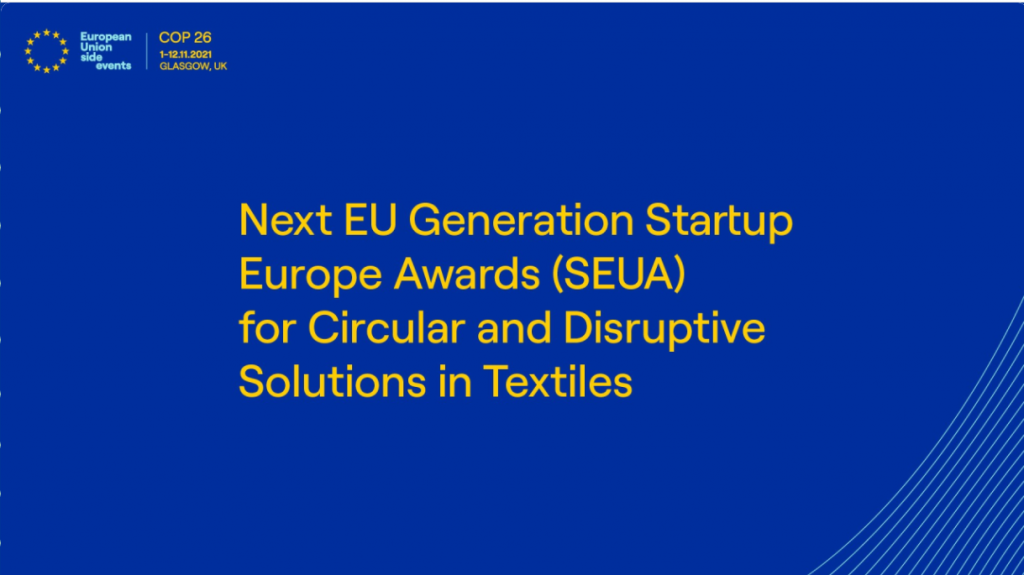
- The European project CircularInnoBooster and its accelerator CirCoAX were present at COP26.
- Spanish company DeleiteWear won Nextextile COP26 Startup Europe Awards.
Brussels, 8.11.2021 – Re-inventing a fashion and textile sector that respects the limits of the planet and whose strategies are framed by social, environmental and economic sustainability. This was one of the main demands of the panel of experts from the textile sector at the Next Generation EU Startup Europe Awards (SEUA) for Circular and Disruptive Solutions in Textiles, led by the Finnova Foundation with the support of the non-profit organisation Zero Waste Scotland. The event was held Saturday 6 November to coincide with the International Day for Preventing the Exploitation of the Environment. During the event held in La Palma at Isonorte Foundation, the winning project of Nextextile COP26 Startup Europe Awards Special Edition was announced, which went to the company DeleiteWear.
Presented and moderated by Juanma Revuelta, CEO of Finnova, the event featured presentations from representatives of the textile sector who were able to analyse new models and processes that enable the achievement of the SDG within the framework of the 2030 Agenda, mainly to reach a circular and regenerative economy. Cutting-edge discussions were presented on collaboration and support for alternative models that close the circles of the value chain in the sector. Also presented at the occasion were the CircularInnoBooster project and its accelerator CirCoAX, which aims to promote a change of model in the fashion and textile sector through an acceleration programme with training and funding. The call of this accelerator that closed last month has received more than 120 applications, which only 30 will receive the €12,000 funding of this COSME project of the European Commission endowed with €360,000 and funded at 75% for two years and whose partners are the European Institute of Design (IED),Texfor, Circulab, Finnova and The Circular Project with HumanNation.
The event was held at 18:30 CET in a hybrid mode, combining face-to-face participation from the island of La Palma with international online speakers. Representatives from the Canary Islands took part, such as Yurena Febles, Networking officer at Cide Canarias, Eduardo Javier Calderón Piñero, Director of Isonorte. The event featured a panel of experts in the fashion and textile sector in Latin America, the European Union, and Scotland, such as Michael Cusack, Head of Sustainability and Business Transformation at ACS Clothing Scotland; David Allo, Head of Sustainability at Texfor; Alejandra Gougy, President of the Asociación Moda Sostenible Argentina; Luis Lehmann, professor and writer; and Sharam Yalda, ecologist, expert in circular business design and founder of the consultancy Human Nation, who represented the EU project CircularInnoBooster and its accelerator CirCoAX.
Around 200 participants from the EU, Scotland and Latin America were able to learn first-hand about innovative EU projects, the importance of the circular economy in the textile and fashion industry and the need to establish climate change actions that promote the green recovery of textiles, which is the second most polluting industry in the world.
Innovation, collaboration and European funds
Juan Manuel Revuelta highlighted the need to understand the call for change in the textile and fashion industries and the importance of innovation, collaboration, and EU funds to achieve sustainability. “We are looking for new models to reinvent fashion and textiles that respect the limits of the planet and include an approach on social, environmental and economic sustainability”, he pointed out.
According to Mr Revuelta, “this COP26 edition will provide an unparalleled opportunity to reflect and to create a new roadmap towards sustainability based both on the goals set out under the Paris Agreement and the European Green Deal and on EU funding facilities like Next Generation”.
DeleiteWear, winner of the Nextextile COP26 Startup Europe Awards
In addition to the CircularInnoBooster project, the protagonists were innovation, clusters such as NextextileGeneration and initiatives that promote public-private partnerships. All of this materialised with the presentation of the Nextextile COP26 Startup Europe Awards Special Edition to DeleiteWear, a Spanish company that began by rescuing and recycling men’s shirts that, due to small imperfections in their fabrics, could no longer be sold. DeleiteWear’s philosophy is based on the certainty that alternatives to fast fashion exist. It is a triple-impact business that aims not only for economic interest, but also for environmental and social benefit. DeleiteWear, consisting of upcycling and circular fashion, is a Spanish project with a minimal carbon footprint and maximum social impact, which protects endangered biodiversity and employs women at risk of social exclusion and victims of trafficking.
The event is available here.
About Finnova Foundation
Finnova Foundation is a Spanish-Belgian foundation which finances innovation. Finnova aims to promote public-private cooperation through innovation to address societal challenges such as jobs, training, entrepreneurship, the UN SDGs, and the circular economy, among others. Finnova works at an EU-level and is headquartered in Belgium, although it also has several offices across Spain, Chile, and Panama.
About Startup Europe Awards
Startup Europe Awards is an initiative by DG CONNECT and has been implemented by Finnova Foundation since 2016. Startup Europe Awards are an open innovation mechanism aimed to identify disruptive start-ups and to promote private-public partnerships. They also seek to raise awareness on the importance of self-entrepreneurship as a driving force for job creation. In addition to promoting networks to meet the UN SDGs and the European Green Deal objectives, they also contribute to the circular economy, sustainable tourism, culture and creativity, and the fight against climate change.

